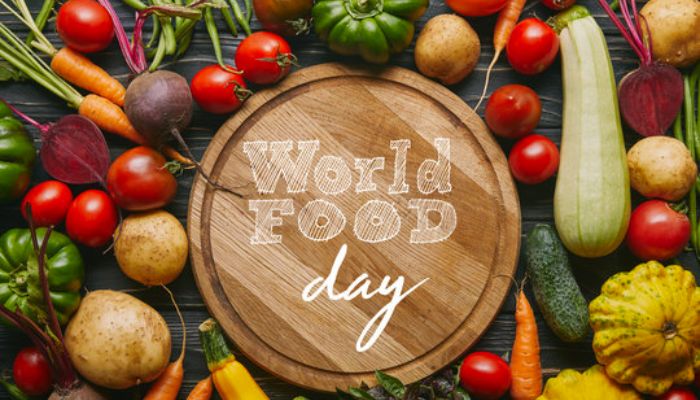World Food Day: Nigeria must work towards food security
On October 16, 2022, the World Food Day was celebrated globally. An initiative by the Food and Agricultural Organisation (FAO) of the United Nations (UN), the global event called attention to worldwide awareness and collective action to combat the issue of hunger and ensure healthy diets for all. Events to mark the day were organised […]

On October 16, 2022, the World Food Day was celebrated globally. An initiative by the Food and Agricultural Organisation (FAO) of the United Nations (UN), the global event called attention to worldwide awareness and collective action to combat the issue of hunger and ensure healthy diets for all. Events to mark the day were organised in 150 countries across the globe with multiple partners and governments participating.
First established in November 1979, as suggested by the former Hungarian Minister of Agriculture and Food, Dr Pal Romany, October 16 of every year was chosen to mark the anniversary of the founding of FAO by the UN in 1945.
- Atiku’s statement on northern presidency threat to unity — Wike
- NIGERIA DAILY: How Bread Turns People’s Lives Upside Down
It has become a day to promote global awareness about hunger, malnutrition, sustainability and food production and raise action for those who suffer from hunger. Indeed, the primary focus of the World Food Day celebration is to tackle global hunger and to strive to eradicate hunger across the world.
The day is also celebrated with other international organisations concerned with food security such as the World Food Programme (WFP), International Fund for Agriculture Development (IFAD) and the United Nations High Commission for Refugees (UNHCR).
The theme of this year’s celebration is “Leave No One Behind, better production, better nutrition and better environment and a better life.”
Unfortunately, according to WFP, as many as 828 million people are left behind to go to bed hungry every night. The UN body noted that the number of those facing acute food insecurity has soared from 135 million to 345 million since 2019 while a total of 50 million people in 45 countries are teetering on the edge of famine.
And the situation is exacerbated by conflict and insecurity in addition to climate crises like droughts and cyclones, all having a disastrous impacts and leading to repeated failed harvests. For example, the war in Ukraine aggravated the global food crisis because of skyrocketing food and fertiliser prices.
Action Against Hunger and the latest report of UN Hunger Hotspots states that 60 per cent of the world’s hungry live in areas afflicted by war and violence. Which is why Nigeria, along with Afghanistan, Ethiopia, Somalia, South Sudan, Syria and Yemen, which are battling terrorism, banditry and other internal crisis, were listed as countries with the highest levels of global hunger.
The WFP reports that in Nigeria, 4.4 million people are facing acute food insecurity in the conflict-affected states of Borno, Adamawa and Yobe with about 1.7 million people receiving food assistance. Aside from these figures, there are concerns about the hunger that will follow the floods this year. Floods this year impacted heavily on states of the federation, destroying homes and washing away farmlands. Torrential rains since June 2022, have swept through 28 of the 36 states and Federal Capital Territory, Abuja, affecting 3.48 million people and leading to many deaths and destruction of over 637,000 hectares of cropland.
So at a time, when the prices of food items are supposed to drop since it is the harvest season, we are faced with this magnitude of disaster. And before then, the latest inflation figure, which was about 22 per cent was caused largely by food inflation, indicating already high prices of food items.
This is why this year’s World Food Day should resonate differently with Nigerian officials as there is a lot to do in that regard. It is simply not enough to mouth food security actions must be taken towards achieving that.
There is a need for coordinated efforts across governments, financial institutions (IFIs), the private sector and partners to mitigate the severe food crisis which is projected for 2023. The WFP insists that such efforts must include the reinforcement of national economies, social protection systems, and regional and domestic food systems, “at speed and at scale.”
We call on the Federal Ministry of Agriculture and Rural Development to lead with policies and programmes geared towards sufficiency in food production. Such programmes like distribution of agricultural inputs and equipment, manpower training for agricultural extension workers, advocacy for local production of fertilisers to boost food production and improved commodity value chain for smallholder farmers and mechanisation for all segments of the population should be implemented.
In addition, agriculture must be taken seriously and government should give priority to subsistence farmers. They should be provided inputs as they cannot be abandoned to their fate, especially as they face the twin issues of insecurity and environmental disasters, which are impediments to their farming activities.
Food security should not just be in pronouncements. With the failed harvests caused by floods this year, governments should empower farmers to embrace dry season farming in full force.
Food is man’s basic need, apart from water, shelter and clothing. Therefore, this year’s World Food Day celebration should remind the world of the need to provide quality food, especially for the great number of people who struggle to have a meal a day.
The world must prioritise the right of all people to food, nutrition and peace while working for a better society devoid of hunger, malnutrition and starvation.
